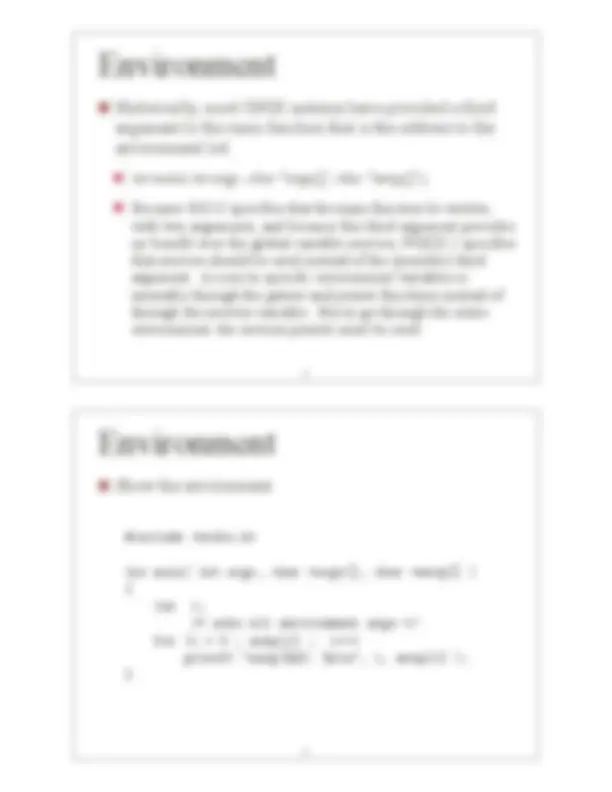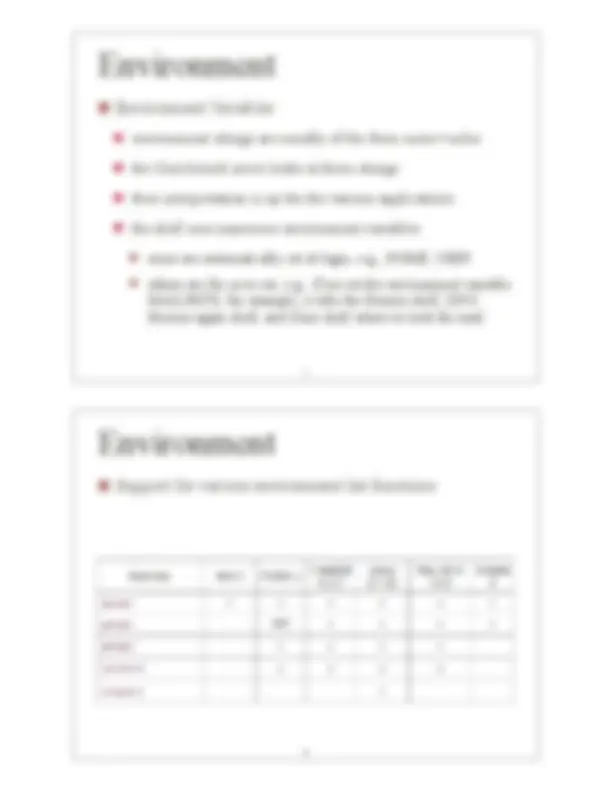Download Environment and more Exams Computer Programming in PDF only on Docsity!
When a program is executed...
process that does exec can pass command-line arguments to
the new program
this is part of the UNIX system shells
1
1 Environment
1.1 Quick Review—Argument List
When a program is executed, the process that does the exec can pass command-
line arguments to the new program. This is part of the normal operation of
the UNIX system shells.
int main( int argc, char *argv[] )
int i;
/* echo all command-line args */
for ( i = 0 ; i < argc ; i++ )
printf( "argv[%d]: %s\n", i, argv[i] );
Environment
Environment List
each program also passed an environment list
this list is an array of char pointers, with each pointer
containing the address of a null-terminated C string
the address of the array of pointers is contained in the global
variable environ :
extern char **environ;
Example of environment with five strings
the null bytes a tthe end of each string are explicitly shown
3 3
Environment
Terms
environ is called the environment pointer
the array of pointers is called the environment list
the strings they point to are called environment strings
Environment Variables
environment strings are usually of the form name=value
the Unix kernel never looks at these strings
their interpretation is up the the various applications
the shell uses numerous environment variables
some are automatically set at login, e.g., HOME , USER
others are for us to set, e.g., If we set the environment variable
MAILPATH, for example, it tells the Bourne shell, GNU
Bourne-again shell, and Korn shell where to look for mail.
7
Environment
Support for various environment list functions
Support for various environment list functions
9 ISO C defines a function that we can use to fetch values from the en- vironment, but this standard says that the contents of the environment are implementation defined. #include <stdlib.h> char *getenv(const char *name); Returns: pointer to value associated with name, NULL if not found Note that this function returns a pointer to the value of a name=value string. We should always use getenv to fetch a specific value from the envi- ronment, instead of accessing environ directly. 10
Environment
Manipulating environment variables
10 In addition to fetching the value of an environment variable, sometimes we may want to set an environment variable. We may want to change the value of an existing variable or add a new variable to the environment. #include <stdlib.h> int putenv(char *str); int setenv(const char *name, const char *value, int rewrite); int unsetenv(const char *name); All return: 0 if OK, nonzero on error The operation of these three functions is as follows.
- The putenv function takes a string of the form name=value and places it in the environment list. If name already exists, its old definition is first removed.
- The setenv function sets name to value. If name already exists in the environment, then (a) if rewrite is nonzero, the existing definition for name is first removed; (b) if rewrite is 0, an existing definition for name is not removed, name is not set to the new value, and no error occurs.
In addition to fetching the value of an environment variable, sometimes
we may want to set an environment variable. We may want to change the
value of an existing variable or add a new variable to the environment.
#include <stdlib.h>
int putenv(char *str);
int setenv(const char *name, const char *value, int rewrite);
int unsetenv(const char *name);
All return: 0 if OK, nonzero on error
The operation of these three functions is as follows.
- The putenv function takes a string of the form name=value and places
it in the environment list. If name already exists, its old definition is
first removed.
- The setenv function sets name to value. If name already exists in the
environment, then (a) if rewrite is nonzero, the existing definition for
name is first removed; (b) if rewrite is 0, an existing definition for name
is not removed, name is not set to the new value, and no error occurs.
Environment
Manipulating environment variables
13 In addition to fetching the value of an environment variable, sometimes we may want to set an environment variable. We may want to change the value of an existing variable or add a new variable to the environment. #include <stdlib.h> int putenv(char *str); int setenv(const char *name, const char *value, int rewrite); int unsetenv(const char *name); All return: 0 if OK, nonzero on error The operation of these three functions is as follows.
- The putenv function takes a string of the form name=value and places it in the environment list. If name already exists, its old definition is first removed.
- The setenv function sets name to value. If name already exists in the environment, then (a) if rewrite is nonzero, the existing definition for name is first removed; (b) if rewrite is 0, an existing definition for name is not removed, name is not set to the new value, and no error occurs.
- The unsetenv function removes any definition of name. It is not an error if such a definition does not exist. Note the difference between putenv and setenv. Whereas setenv must allocate memory to create the name=value string from its arguments, putenv is free to place the string passed to it directly into the envi- ronment. On Linux and Solaris, the putenv implementation places the address of the string we pass to it directly into the environment list. In this case, it would be an error to pass it a string allocated on the stack, since the memory would be reused after we return from the current function. int setenv(const char *name, const char *value, int rewrite); int unsetenv(const char *name); All return: 0 if OK, nonzero on error The operation of these three functions is as follows.
- The putenv function takes a string of the form name=value and places it in the environment list. If name already exists, its old definition is first removed.
- The setenv function sets name to value. If name already exists in the environment, then (a) if rewrite is nonzero, the existing definition for name is first removed; (b) if rewrite is 0, an existing definition for name is not removed, name is not set to the new value, and no error occurs.
- The unsetenv function removes any definition of name. It is not an error if such a definition does not exist. Note the difference between putenv and setenv. Whereas setenv must allocate memory to create the name=value string from its arguments, putenv is free to place the string passed to it directly into the envi- ronment. On Linux and Solaris, the putenv implementation places the address of the string we pass to it directly into the environment list. In this case, it would be an error to pass it a string allocated on the stack, since the memory would be reused after we return from the current function. 11














